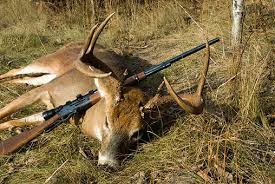Indian Legal System > Civil Laws > Environmental Laws > Wildlife Protection Act, 1972 > Hunting Defined (Section 2(16))

Hunting and trapping have been enjoyed by human beings since ancient times. Proponents of hunting and trapping often argue that a subsidiary benefit of these activities is their reduction of wildlife damage. However, the efficacy of hunting and trapping to reduce wildlife damage has not been substantiated. Actually, it had damaged the environment and impacted the ecosystem. Hunting and trapping are used by state and federal wildlife agencies to manage wildlife populations according to objectives set by society.
Definition of Hunting Under the Act:
Sec. 2(16) of Wildlife Protection Act, 1972 defines the word hunting. The Section says that hunting”, with its grammatical variations and cognate expressions, includes,—
(a) killing or poisoning of any wild animal or captive animal and every attempt to do so;
(b) capturing, coursing, snaring, trapping, driving or baiting any wild or captive animal and every attempt to do so;
(c) injuring or destroying or taking any part of the body of any such animal or, in the case of wild birds or reptiles, damaging the eggs of such birds or reptiles, or disturbing the eggs or nests of such birds or reptiles;
The definition of hunting under the Wildlife Protection Act is quite comprehensive. It not only covers capturing, killing, poisoning, snaring and trapping of wild animals but also includes every attempt to do so. Further, hunting also includes ‘driving’ any wild animal for the above said purposes. Injuring or destroying or taking any part of the body of any such wild animal or in the case of a wild bird or reptile, damaging the egg of such birds or reptiles or even disturbing the eggs or nests of such birds or reptiles would also amount to hunting.
Scheduled Species:
The concept of scheduled animal’ was introduced in the 1986 vide Amendment Act, 1986. A scheduled animal is defined to include any animal listed in Schedule I and Part II of Schedule II whereas, a wild animal is listed in different schedules i.e. Schedule I, II, III, and IV in accordance with the degree of protection accorded to it. The scheduled animal has been accorded the highest protection. Trade in any such scheduled animal is completely banned.
Specified plants are those which are specified in schedule VI of the Wildlife Protection Act. Only six species of plant have been included in this schedule. Chapter IIIA prohibits willful picking, uprooting, damaging, destroying, acquiring or collecting any specified plant from any forest land or any area specified by notification by the Central Government.
Cases where Hunting of Wild Animals is permitted:
Hunting of wild animals is to be permitted in certain cases provided under section 11. Section 11 distinguishes between Schedule 1 and the rest of the animals listed in schedule II to IV in the following manner.
In case of schedule I animal, if the Chief Wildlife Warden of any state is satisfied that such animal has become dangerous to human life or is so disabled or diseased beyond recovery then he may, by order in writing and stating the reasons therefor, permit any person to hunt such animal or cause such animal to be hunted.
In case of a wild animal specified in Schedule II to IV, the Chief Wildlife Warden or an Authorised Officer may permit such hunting as stated above not only when such wild animal has become dangerous to human life but also when it becomes dangerous to property and such property may include standing crops on any land.
The above distinction clearly shows that even when a Schedule I animal becomes dangerous to property then it cannot be hunted. Secondly, in case of Schedule I animal, only the Chief Wildlife Warden has empowered to grant the permission to any person to hunt such animal. Provided that no wild animal shall be killed if it can be captured, tranquilized or translocated according to Chief Wildlife Warden’s satisfaction. Such animal shall not be kept in captivity if it can be rehabilitated in wild. Any person may be permitted to hunt such animal in a specified area. Another exception where hunting of wild animal may be permitted is in case of killing or wounding of any wild animal in good faith in defence of one-self or of any other person and such animal shall be Government property.
Grant of Permit for Special Purposes:
The permit for hunting shall also be granted by the Chief Wildlife Warden in special purposes on payment of a prescribed fee. The purpose may be education, scientific research, and scientific management (translocation of any wild animal to an alternative suitable habitat; or population management of wildlife, without killing or poisoning or destroying any wild animals), collection of specimens (for recognized zoos subject to the permission under section 38-1 or for museums and similar institutions), derivation, collection or preparation of snake venom for the manufacture of life-saving drugs. These permits shall not be granted without the prior permission of the Central Government (Schedule I) and State Government (Schedule II-IV).
Prohibition of Hunting:
Any person who hunts any wild animal shall be punishable with imprisonment for a term which may extend to 3 years or with fine which may extend to Rs. 25000/- or with both. However, if any person commits the offence in the sanctuary or national park, with respect any animal specified in Schedule I, he shall be punishable with imprisonment which shall not be less than 1 year but may extend to 6 years and also with fine which shall not be less than 5000/-.